Navigating the complexities of a kitten's feeding schedule from their fragile beginnings to the first year of life demands a meticulous approach and dedication to their nutritional needs. As caretakers, understanding the pivotal role of feeding routines in fostering optimal growth and health for these tiny companions is essential.
From the initial stages of bottle-feeding to the gradual transition to solid foods, each phase in a kitten's feeding journey sets the foundation for their well-being. Careful monitoring and adherence to recommended guidelines are vital components in this nourishing odyssey, ensuring that each meal served contributes to their long-term vitality.
Key Takeaways
- Feed newborn kittens every 2-4 hours with kitten milk replacer.
- Gradually introduce wet food during weaning and transition to solid food by 8 weeks.
- Monitor growth progress, weight gain, and feeding habits closely.
- Consult a vet for optimal nutrition, weight management, and smooth dietary transitions.
Newborn Feeding Guidelines
When caring for newborn kittens, establishing a structured feeding routine is crucial to their health and development. Newborn kittens typically need to be fed every 2-4 hours, including overnight, as they have tiny stomachs and fast metabolisms.
It's essential to use a commercial kitten milk replacer specifically formulated to meet their nutritional needs, as standard milk or dairy alternatives can cause digestive issues.
When bottle-feeding, ensure proper technique by holding the kitten at a 45-degree angle and allowing them to suckle naturally. Monitor their weight gain regularly to ensure they are growing at a healthy rate.
If you have any concerns about their feeding or development, consult a veterinarian for guidance and support.
Transitioning to Wet Food
Transitioning to wet food in a kitten's diet is an essential step in their nutritional development. Wet food provides kittens with additional hydration and can help them transition from a milk-based diet to solid foods.
When introducing wet food, it is important to choose high-quality options formulated specifically for kittens to ensure they receive the necessary nutrients for growth and development. Start by mixing a small amount of wet food with formula or water to create a soft consistency that is easy for kittens to eat. Gradually increase the proportion of wet food in their diet while decreasing the formula or water until they are fully weaned onto wet food.
This process should be done slowly over a period of about a week to prevent digestive upset.
Introducing Dry Food
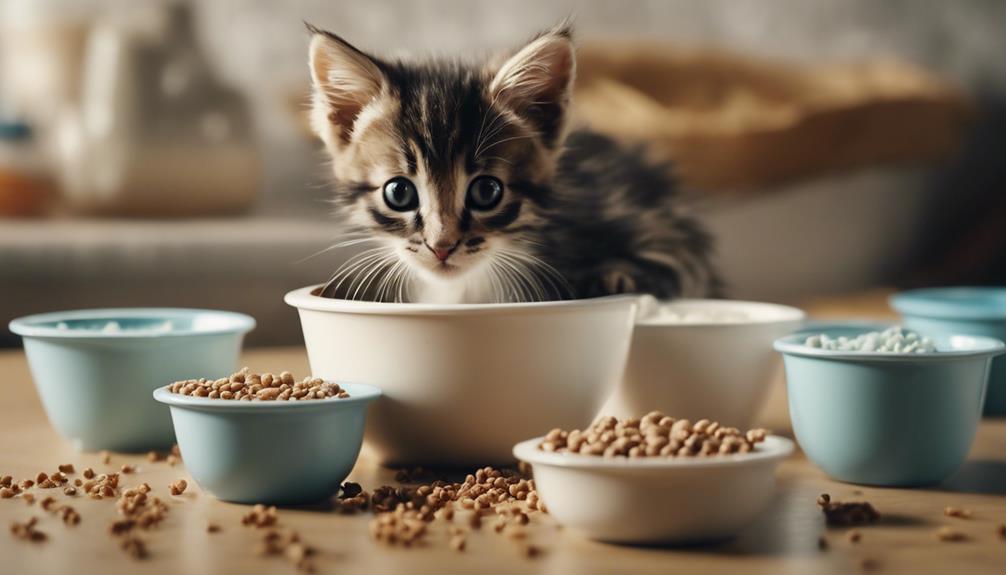
Introducing dry food into a kitten's diet marks a crucial step towards their nutritional progression and independence. As kittens grow, their dietary needs evolve, and dry food provides essential nutrients while also helping to promote dental health. When introducing dry food, it's important to do so gradually to allow the kitten to adjust to the new texture and taste. Start by mixing a small amount of dry food with their wet food, gradually increasing the ratio over a week or two. Below is a table summarizing key points to consider when introducing dry food to kittens:
| Considerations | Details |
|---|---|
| Gradual Transition | Mix dry food with wet food to ease the switch |
| Nutritional Balance | Ensure the dry food meets kitten's dietary needs |
| Dental Health | Dry food can help promote dental hygiene |
| Water Availability | Always provide fresh water alongside dry food |
| Monitor Kitten's Reaction | Watch for any digestive issues or refusal to eat |
Vaccination Schedule at 8 Weeks
As kittens reach 8 weeks of age, initiating a vaccination schedule becomes imperative to safeguard their health and immunity against common feline diseases. At this age, kittens should receive their first core vaccinations, which typically include vaccines for feline herpesvirus, calicivirus, and panleukopenia. These initial vaccinations are crucial in building a strong immune response to protect kittens from serious illnesses.
Additionally, depending on the kitten's lifestyle and environment, your veterinarian may recommend additional vaccines such as those for feline leukemia virus or rabies. It is essential to follow the recommended vaccination schedule provided by your veterinarian to ensure your kitten's optimal health and protection against preventable diseases.
Regular vaccinations are key in promoting a healthy and long life for your furry companion.
Establishing Twice-Daily Feedings
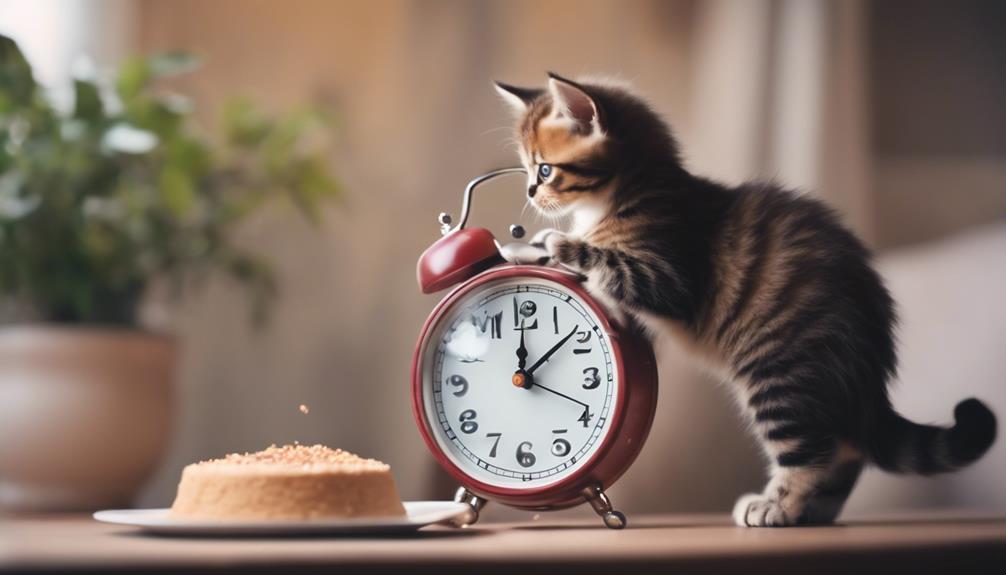
To ensure optimal nutrition and growth for kittens, establishing a consistent twice-daily feeding schedule is essential. After the initial phase of frequent feedings and weaning, transitioning to twice-daily meals helps regulate their dietary intake.
At around 2 months of age, kittens are ready for this schedule, which aligns with their developing digestive capabilities. Feedings should be evenly spaced throughout the day to prevent hunger-induced behavior issues and ensure they receive adequate nutrition.
Monitoring Growth Progress
Monitoring the kittens' growth progress is crucial for ensuring they are developing healthily and reaching appropriate milestones. By closely observing their development, you can identify any potential issues early on and take necessary actions to address them promptly.
Keep an eye on their physical growth, such as weight gain and body size, as well as their overall activity levels and behavior. Regular monitoring allows you to track their progress over time and make informed decisions regarding their care and nutrition.
If you notice any concerns or deviations from the expected growth trajectory, consulting with a veterinarian is advisable to ensure the kittens receive the support they need for optimal health and development.
Weighing Kittens Regularly
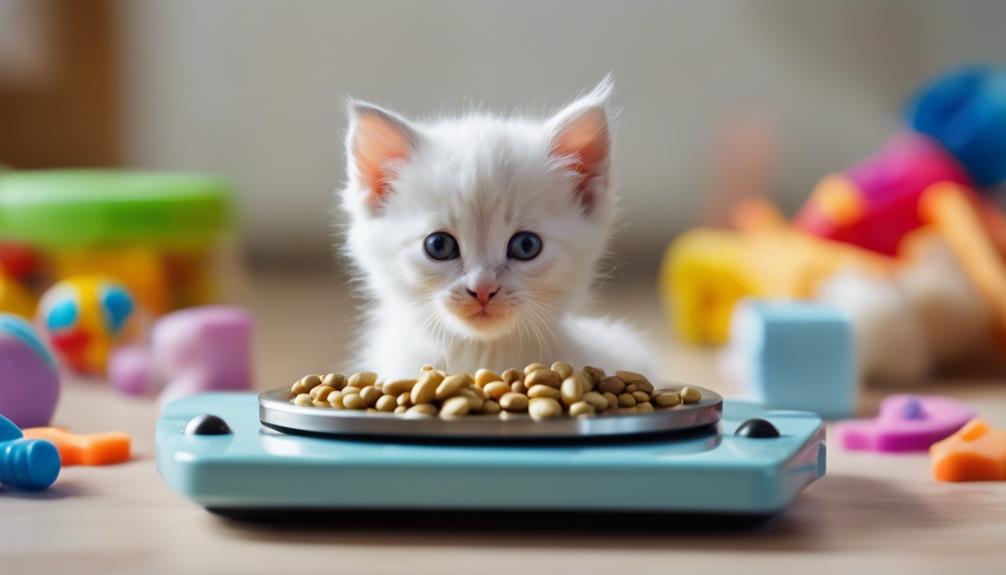
Regularly weighing kittens is essential for tracking their growth progress and ensuring they are developing healthily and meeting appropriate milestones. By monitoring their weight consistently, you can detect any potential issues early on, such as inadequate weight gain or sudden drops in weight that may indicate health concerns.
Weighing kittens allows you to adjust their feeding regimen accordingly, ensuring they receive the necessary nutrients for optimal growth. A digital scale specifically designed for weighing small animals is recommended for accurate measurements. It's advisable to weigh kittens at the same time each day, preferably before their first meal.
Remember to record their weights regularly to create a comprehensive growth chart that can be shared with your veterinarian for further evaluation if needed.
Ensuring Proper Weight Gains
Ensuring proper weight gains in kittens is crucial for monitoring their growth and overall health development. Adequate weight gain is a key indicator of a kitten's overall well-being and can signal potential health issues if not on track. Kittens should gain weight steadily during their development, with specific milestones to achieve.
Monitoring weight gain ensures that kittens are receiving sufficient nutrition and are growing as expected. Factors such as feeding frequency, portion sizes, and nutritional content play a vital role in promoting healthy weight gains. By tracking weight consistently and adjusting feeding practices as needed, caregivers can help kittens reach their growth potential and thrive into adulthood.
Consulting Vet for Weight Concerns
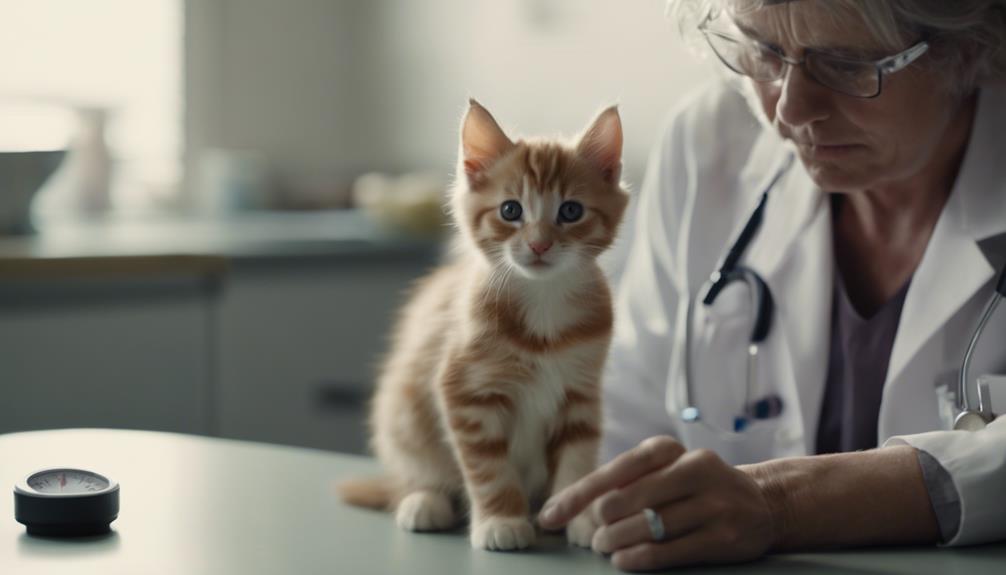
If you have concerns about your kitten's weight, seeking guidance from a veterinarian is essential for ensuring their optimal growth and well-being. Regular monitoring and evaluation of your kitten's weight can help identify any potential issues early on. A vet can provide tailored advice based on your kitten's specific needs and development stage. Here is a table outlining when you should consult a vet regarding your kitten's weight:
| Age of Kitten | Weight Concerns | Action |
|---|---|---|
| Newborn to 4 weeks | Weight loss or lack of gain | Immediate veterinary consultation |
| 4 to 8 weeks | Inadequate weight gain | Schedule a vet appointment for advice |
| 8 weeks onwards | Sudden weight loss or stagnation | Seek vet guidance promptly |
Nutrition Guidelines for Growing Kittens
When considering the optimal nutrition for growing kittens, it is crucial to monitor their weight and feeding habits closely to support their healthy development. Kittens should be fed a diet specifically formulated for kittens to meet their unique nutritional needs, including higher protein and fat content.
It is important to feed kittens until they are full, especially in the early stages of growth. Weaning off milk should begin around 4 weeks of age, introducing wet food gradually during this process. By 8 weeks, kittens should transition to solid food to support their developing teeth and jaws.
Before transitioning to adult cat food, consult a veterinarian to ensure a smooth and healthy dietary change.
Transitioning to Adult Cat Food
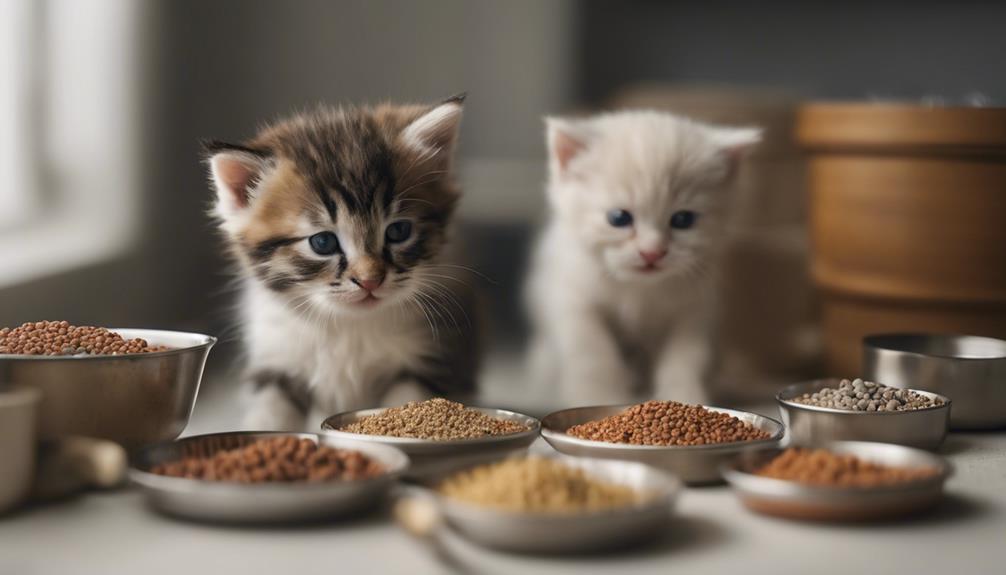
Transitioning kittens to adult cat food should be done gradually to ensure their digestive systems adjust smoothly to the new diet. Start by mixing a small amount of adult cat food into their kitten food, gradually increasing the proportion over 7-10 days.
Monitor your kitten for any signs of digestive upset during this transition period, such as vomiting or diarrhea. It's essential to choose a high-quality adult cat food that meets the nutritional needs of your growing cat. Look for formulations specifically designed for kittens transitioning to adult food, as these will provide the necessary balance of nutrients.
Consult with your veterinarian if you have any concerns or questions about the transition process.
Frequently Asked Questions
Can Orphaned Kittens Be Fed Cow's Milk or Dairy Alternatives if Commercial Kitten Milk Replacer Is Not Available?
Orphaned kittens should not be fed cow's milk or dairy alternatives if commercial kitten milk replacer is unavailable. These options lack essential nutrients and can lead to nutritional deficiencies. Consult a veterinarian for appropriate feeding recommendations to ensure the kittens' health.
How Can I Tell if a Kitten Is Not Tolerating the Transition From Milk to Wet Food During Weaning?
Signs that a kitten may not be tolerating the transition from milk to wet food during weaning include gastrointestinal upset, decreased appetite, vomiting, diarrhea, and lethargy. Monitor closely and consult a veterinarian for guidance.
Is It Necessary to Monitor the Feeding Schedule of Kittens That Are Being Fostered by Their Mother?
Monitoring the feeding schedule of kittens fostered by their mother is crucial. While the mother cat typically handles feeding, observing the kittens ensures all are nursing adequately. Regular monitoring helps identify any issues early, promoting healthy growth and development.
At What Age Should Kittens Be Introduced to Catnip as Part of Their Diet?
Kittens can typically be introduced to catnip as a dietary supplement around 8-12 weeks of age. It's important to monitor their reaction to it and introduce it gradually. Consult with a veterinarian to ensure it is suitable for your kitten's health.
Are There Any Special Considerations for Feeding Kittens With Specific Health Conditions or Dietary Restrictions?
When feeding kittens with health conditions or dietary restrictions, consult a veterinarian for tailored advice. Special considerations may include specific nutrient requirements, alternative feeding methods, or prescription diets. Ensure the kitten's unique needs are met for optimal health.
What Should the Feeding Schedule Be for a Newborn Kitten?
When bottlefeeding newborn kittens, it’s important to establish a feeding schedule. For the first few weeks, they should be fed every 2-3 hours, including during the night. As they grow, you can gradually space out the feedings. Always follow the guidance of a veterinarian for proper nutrition and care.
Conclusion
In conclusion, adhering to a strategic feeding schedule is crucial for nurturing a kitten from birth to one year. Understanding their specific dietary needs at each stage of growth, monitoring their weight gain, and ensuring proper nutrition are essential for their overall health and development.
By following recommended guidelines and consulting with a vet as needed, you can contribute to the long-term well-being and happiness of your feline companion.




